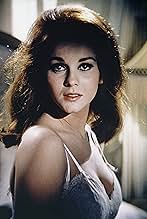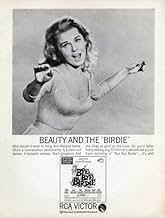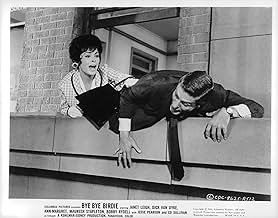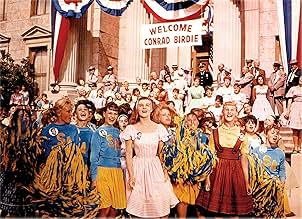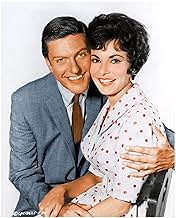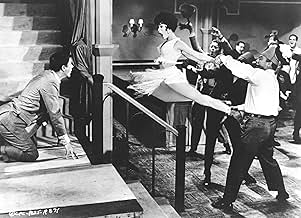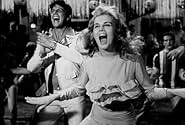ÉVALUATION IMDb
6,6/10
9,8 k
MA NOTE
Un chanteur de rock se rend dans une petite ville de l'Ohio pour dire "adieu" à la télévision et embrasser sa plus grande fanatique avant qu'il ne soit repêché.Un chanteur de rock se rend dans une petite ville de l'Ohio pour dire "adieu" à la télévision et embrasser sa plus grande fanatique avant qu'il ne soit repêché.Un chanteur de rock se rend dans une petite ville de l'Ohio pour dire "adieu" à la télévision et embrasser sa plus grande fanatique avant qu'il ne soit repêché.
- Director
- Writers
- Stars
- Nommé pour 2 oscars
- 7 nominations au total
Avis en vedette
This musical, for those of us who were of the age then, represents a time and a place we thought would not end. Entering our early teens in suburbia, begat of young war veterans, the biggest issues in our lives were those reflected in this film; who pinned who and the adulation of our musical icons. The whole world was Sweet Apple and "someday we would find out this was what life was all about" as Kim sings to a befuddled Hugo. Even nerds could fall in love. And an equal force in our weekly lives was the Sunday ritual of The Ed Sullivan Show. This is a beautiful homage to that world that would end seven months later in Dallas and bring with it the counter culture, riots and Viet Nam. Hard to put on a happy face... But you will with this score. More fifties and Bosa Nova then the hip sixties it is toe tapping and gets under your skin. Worth repeat viewings. And as always "I gotta be sincere..if you feel it in here.." and I still do.
Instead of an adaptation of the original musical, it might be better to think of this movie as "A Variation on the Theme of Bye Bye Birdie." I've loved it since I was a kid and I don't really care how much or how little it's been changed. As a work standing on it's own it is wonderful, goofy, and good fun. An excellent piece of musical film-making. The casting is superb and I still laugh throughout the movie. Dated? Somewhat. Perhaps only superficially. 'N Sync was just in town and their effect here makes me think there's something fundamentally timeless about the behavior of teenage girls. I've heard it was the same when Frank Sinatra was a young singer. And there may be something timeless about us guys too... I'm still a sucker for the beginning and ending with Ann-Margret singing. She opens the movie sounding like a whining petulant little girl and at the end her reprise is as a worldly sophisticated sex-kitten. Just too cool.
I tend to agree with Alice from Orlando regarding this film. While "Bye Bye, Birdie" is a terrific film with terrific performances, viewed today, it's also a tribute to an era that we'll never get back. I completely agree with those historians who feel that 1953 - 1963, the ten year period between the end of the Korean War and that dark day in Dallas, was the last real "Era of Good Feeling" in American history. By and large, we knew who we were, what we were, and where we were going. Then came political assasination, the "Summer of Love," Viet Nam, Watergate, et. al., and we have a society that's not sure of anything anymore. Happily, there are films like "Bye Bye, Birdie," made during the apex of the 1953-63 period, to remind those of us who came of age during that era what we've lost, and to show those who weren't there what it was like. Would that we all had a Sweetapple, Ohio, to go back to again.
I really mean it. On the surface, it appears to be a funny, innocent, slap-happy musical. And it is - at least during the first half of the movie. Then it starts to wink at itself. I was ten when I first saw it, and though I enjoyed it a lot of it went way over my head. Watching it now, ten years later, I realize that BYE BYE BIRDIE is actually a smart, sophisticated satire that's not for kids.
The title character is Conrad Birdie, a vain, oily rock-'n'-roll star who's been drafted by the army. In fact, the movie focuses not so much on him as it does on the other characters - a songwriter and producer (Dick Van Dyke), his girlfriend (Janet Leigh), and a teenage girl named Kim (Ann-Margret). Forget Jesse Pearson, who plays Conrad; it's Van Dyke and Margret's movie all the way.
As I said, this film is actually a satire. There are so many in-jokes and jabs at the 1960s that watching it is almost like reading an issue of MAD or CRACKED magazine. In particular, the Cold War comes in for some heavy ribbing (this movie was made during 1962, the year of the Cuban Missile Crisis); the Soviets are made to look like pompous buffoons, with one guy even whacking himself in the head with his shoe (hint, hint). It's still pretty funny nearly four decades later, but I can imagine how much more of a punch it would have packed back during those foreboding times. In other scenes, the movie predates the style of John Waters by poking some fun at suburbia.
Lots of satire - and most of it decisively adult. You can bet that kids simply won't understand the scathingly sarcastic remarks delivered by Kim's Archie Bunkeresque father (Paul Lynde), or Kim's budding sexuality. And of course they're not going to be familiar with Ed Sullivan (himself). Still, there are lots of joyfully kinetic dance numbers and memorable songs (most notably "Going Steady," "Got a Lot of Livin' To Do," and the tune everybody remembers: "Put on a Happy Face"). Kids will want to fast-forward the VCR to the musical numbers, and also the funniest moment in the picture, which involves a glass of drugged milk and a ballet conductor.
An excellent, well-made, highly underestimated comedy, and infinitely superior to the made-for-TV version from 1995. So get a bowl of popcorn and check out this classic piece of popular culture. Just be prepared to explain a lot to the kiddies...
The title character is Conrad Birdie, a vain, oily rock-'n'-roll star who's been drafted by the army. In fact, the movie focuses not so much on him as it does on the other characters - a songwriter and producer (Dick Van Dyke), his girlfriend (Janet Leigh), and a teenage girl named Kim (Ann-Margret). Forget Jesse Pearson, who plays Conrad; it's Van Dyke and Margret's movie all the way.
As I said, this film is actually a satire. There are so many in-jokes and jabs at the 1960s that watching it is almost like reading an issue of MAD or CRACKED magazine. In particular, the Cold War comes in for some heavy ribbing (this movie was made during 1962, the year of the Cuban Missile Crisis); the Soviets are made to look like pompous buffoons, with one guy even whacking himself in the head with his shoe (hint, hint). It's still pretty funny nearly four decades later, but I can imagine how much more of a punch it would have packed back during those foreboding times. In other scenes, the movie predates the style of John Waters by poking some fun at suburbia.
Lots of satire - and most of it decisively adult. You can bet that kids simply won't understand the scathingly sarcastic remarks delivered by Kim's Archie Bunkeresque father (Paul Lynde), or Kim's budding sexuality. And of course they're not going to be familiar with Ed Sullivan (himself). Still, there are lots of joyfully kinetic dance numbers and memorable songs (most notably "Going Steady," "Got a Lot of Livin' To Do," and the tune everybody remembers: "Put on a Happy Face"). Kids will want to fast-forward the VCR to the musical numbers, and also the funniest moment in the picture, which involves a glass of drugged milk and a ballet conductor.
An excellent, well-made, highly underestimated comedy, and infinitely superior to the made-for-TV version from 1995. So get a bowl of popcorn and check out this classic piece of popular culture. Just be prepared to explain a lot to the kiddies...
I am usually in the corner of those who complain about how Hollywood generally altered many classic Broadway stage musicals into something radically different when they were made into movies. Most of the time, the changes were ridiculous and weakened the property dramatically.
"Bye Bye Birdie" though, is the rare exception where the changes made to get it to the big screen were absolutely necessary. And nothing demonstrates this more than the fact that the faithful 1995 TV version is a lumbering, slow-moving mess that manages to demonstrate perfectly how what plays great on the stage does not always translate effectively to the film medium.
By contrast, the 1963 film version decided to make itself a bright, colorful film extravaganza that played to the strengths of the film medium. And the results in my opinion, worked wonderfully.
To a stage fan like "citybuilder" who rips the changes from the play, he needs to stop and think of how the structure of the stage version, which has the Sullivan show moment and the punching of Conrad as an Act I finale, would never have worked on film. It simply makes more cinematic sense to move that to the end. And the whole big deal over Rose's ethnicity, which was really done to showcase the talent of Broadway lead Chita Rivera, would have been a distraction as well because spotlighting Albert's mother as a racist would have gone against the whole tone of the movie (and truth be told "Spanish Rose" is not that great a song). Likewise, it's better to have Albert sing "Put On A Happy Face" to Rose rather than a nameless Conrad Birdie fan we never see again.
Dick Van Dyke and Paul Lynde offer the right amount of gravitas from the Broadway cast, Janet Leigh in her black wig gets to show off her dancing talent which she seldom got a chance to do (her singing is admittedly a bit thin, but she gets by), and of course Ann-Margret totally elevates the role of Kim McAfee into a star vehicle, and who can blame them for doing this? Her rendition of the title song written for the film is enough to leave one gasping for air, yet she still manages to be convincing as the wide-eyed teenager just the same.
Ultimately, stage fans can be satisfied that they got the version they prefer done on film (though it should be noted that the 95 version is not a pure rendition of the 1960 stage script, but rather the 1991 touring revival), but movie fans got the better end of things with this version in 1963. It will never be among the great movie musicals, but it is two solid hours of colorful early 60s fun.
"Bye Bye Birdie" though, is the rare exception where the changes made to get it to the big screen were absolutely necessary. And nothing demonstrates this more than the fact that the faithful 1995 TV version is a lumbering, slow-moving mess that manages to demonstrate perfectly how what plays great on the stage does not always translate effectively to the film medium.
By contrast, the 1963 film version decided to make itself a bright, colorful film extravaganza that played to the strengths of the film medium. And the results in my opinion, worked wonderfully.
To a stage fan like "citybuilder" who rips the changes from the play, he needs to stop and think of how the structure of the stage version, which has the Sullivan show moment and the punching of Conrad as an Act I finale, would never have worked on film. It simply makes more cinematic sense to move that to the end. And the whole big deal over Rose's ethnicity, which was really done to showcase the talent of Broadway lead Chita Rivera, would have been a distraction as well because spotlighting Albert's mother as a racist would have gone against the whole tone of the movie (and truth be told "Spanish Rose" is not that great a song). Likewise, it's better to have Albert sing "Put On A Happy Face" to Rose rather than a nameless Conrad Birdie fan we never see again.
Dick Van Dyke and Paul Lynde offer the right amount of gravitas from the Broadway cast, Janet Leigh in her black wig gets to show off her dancing talent which she seldom got a chance to do (her singing is admittedly a bit thin, but she gets by), and of course Ann-Margret totally elevates the role of Kim McAfee into a star vehicle, and who can blame them for doing this? Her rendition of the title song written for the film is enough to leave one gasping for air, yet she still manages to be convincing as the wide-eyed teenager just the same.
Ultimately, stage fans can be satisfied that they got the version they prefer done on film (though it should be noted that the 95 version is not a pure rendition of the 1960 stage script, but rather the 1991 touring revival), but movie fans got the better end of things with this version in 1963. It will never be among the great movie musicals, but it is two solid hours of colorful early 60s fun.
Le saviez-vous
- AnecdotesIronically, Bobby Rydell, who plays the timid Hugo Peabody, was himself a national teen idol before and after the film's production. In fact, in contrast to the original stage musical where Michael J. Pollard played the role, the part of Hugo was expanded significantly in the film to accommodate his teen celebrity.
- GaffesAfter Rosie pulls the McAfee family out of the audience at Toast of the Town (1948), two different shots of the Russian conductor show the McAfees still sitting in the audience.
- Citations
Rose DeLeon: I must be the prized dope of all-time... thinking I could pry you away from your mama's ever-lovin' tentacles.
- Générique farfeluThere is no "The End" credit or cast list at the end of the film. Ann-Margret simply sings an on-screen reprise of the song "Bye Bye Birdie" at the end, and then says " 'Bye, now!".
- ConnexionsEdited into Histoire(s) du cinéma: Seul le cinéma (1994)
- Bandes originalesBye Bye Birdie
Music by Charles Strouse
Lyrics by Lee Adams
Performed by Ann-Margret before the title credits, with Johnny Green and the Columbia Studio Orchestra and Chorus
Reprised by Ann-Margret in the finale
Meilleurs choix
Connectez-vous pour évaluer et surveiller les recommandations personnalisées
- How long is Bye Bye Birdie?Propulsé par Alexa
Détails
- Date de sortie
- Pays d’origine
- Langues
- Aussi connu sous le nom de
- Adiós, ídolo mío
- Lieux de tournage
- société de production
- Consultez plus de crédits d'entreprise sur IMDbPro
Box-office
- Brut – États-Unis et Canada
- 13 129 412 $ US
- Durée1 heure 52 minutes
- Couleur
- Rapport de forme
- 2.35 : 1
Contribuer à cette page
Suggérer une modification ou ajouter du contenu manquant

Lacune principale
What is the Brazilian Portuguese language plot outline for Bye Bye Birdie (1963)?
Répondre


